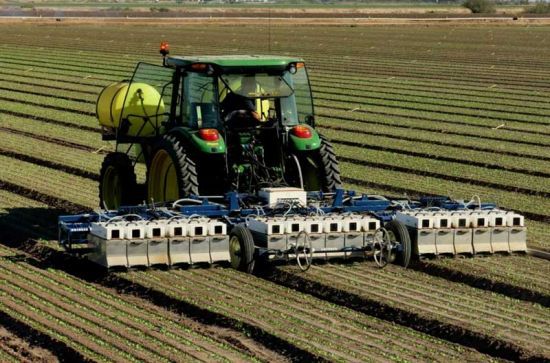Blue River Technology, the Californian startup that is using robots to weed, thin and spray vegetable fields, has raised $17 million in a competitive Series B funding round.
Pontifax Global Food and Agriculture Technology Fund led the round and was joined by two agribusiness corporate venture arms Syngenta Ventures and Monsanto Growth Ventures. Blue River’s heavy-hitting existing investors — Khosla Ventures, Data Collective Venture Capital, and Eric Schmidt’s Innovation Endeavors — also participated in a round that saw Blue River turning potential investors away, according to Jorge Heraud, co-founder and CEO of Blue River.
“We were lucky to have multiple term sheets and selected those that we liked the most based on the partnerships and knowledge they brought to the business,” he told AgFunderNews.
Blue River’s units use computer vision and machine learning to observe and identify plants in need of chemical treatment, weeding or thinning; make a fast decision on the appropriate course of action; and execute that action in real time. The company claims that this precision application of inputs — in comparison to the broad-based application of fertilizer and chemicals that traditional equipment allow — will reduce the amount of chemicals used in agriculture by 90 percent.
Hired by producers as a service to perform weeding, thinning and spraying using its machines, Blue River is providing “plant-by-plant care” on 10 percent of the US lettuce market using its six machines currently in use, according to Heraud.
Adopting this go-to-market strategy has enabled Blue River to produce three generations of its machine within three years. And generation three is 100 times faster and more accurate than the first generation; it can process 5,000 plants a minute, according to Heraud.
“With a new technology, the name of the game is learning and iterating really fast, so we chose this route to market [providing a service] to maximize learning,” he said. “We also chose to focus on lettuce first as it’s grown year-round and not just once a year as many others are. This short cycle has also allowed us to be at our third generation in three years.”
Blue River has plans to move into other crop types and will use this week’s funding to hire more engineers and build a new generation of robot for multiple crops. The fourth generation robot will also be able to perform other applications — beyond weeding and thinning — such as applying other chemicals and nutrients that are beneficial to specific crops.
“One big focus for us is to be able to understand the needs of every plant,” said Heraud. “This plant is growing slower than others so needs more nutrients, for example. Some crops are getting about $500 worth of insecticide or fungicide, but not all chemicals that farmers are using are getting to the target; a lot is wasted, and that’s the real opportunity, especially for crops that we eat like vegetables, although we plan to move into row crops too.”
Gabriel Wilmoth, an investment manager with Syngenta Ventures who was involved in the round, was particularly excited about a row crop application down the road. “We’ve been continually impressed by the caliber and progress of the Blue River team. If they’re successful in applying their technology in broad acre crops, like corn and soy, it will offer real benefits for growers,” he told AgFunderNews.
Analyzing this potential to grow from a narrowly-defined, disciplined specialty crop focus and functionality to a much broader set of capabilities and applications was a key part of Pontifax’s deep due diligence process, which led the other investors in the round, according to Philip Erlanger, managing partner at the firm.
Blue River’s rare positioning around in-field machinery compared to other agtech startups was another major motivator for Pontifax.
“Over the past year and a half, we’ve really focused on technologies that are actually executed in the field,” Erlanger told AgFunderNews. “There are numerous applications that are data-driven. But there are very few examples of machines in the field that embody real intelligence and a capability to address key issues for farmers at the execution phase of cultivation. We feel that Blue River is head and shoulders above others in being able to observe precisely individual plants in the field and to then diagnose and take action.”
Pontifax is also excited about Blue River’s potential to serve the growing food traceability needs of consumers as major retailers look for data to provide their customers on the use of chemicals and other growing conditions.
“Blue River’s ability to observe and monitor a plant feeds so well into the growing movement for food traceability, and while the company is collecting data in a very targeted way, they have the capability to expand this data collection and use it to provide retailers with the information they need on traceability,” said Erlanger.
This is the third round of funding for Blue River, which raised $3 million in an initial Series A round in 2012 and a further $10 million in top-up Series A-1 funding at the beginning of 2014.
According to its investors, Blue River had a precise and intelligent use of proceeds in mind when deciding on how much capital to raise, this time, which reflects Heraud’s measured approach to capital raising.
“There is more or less a rule of thumb with startups that you raise funding every two to three years, and we think $17 million should be the perfect amount to develop the next machine and scale it out over the next two years,” said Heraud.
Erlanger added: “Jorge is a very good, responsible, sensible business person. He’s thoughtful and careful. In addition to being an extraordinary tech company, they have a really solid business model and real discipline.”
Have news or tips? Email [email protected]





